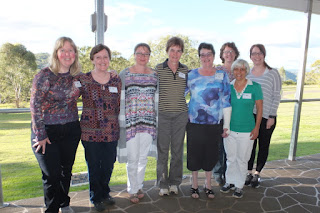This past week, we moved into a lovely unit almost as big as
our old home of thirty-two years. However, the available space for books
certainly isn’t as big. In my husband’s old study, there was a wall of built-in
bookshelves which we, of course, could not remove. So our current task is to
try to fit all our books into the bookshelves we could bring with us—or perhaps
buy bigger ones!
Now my husband did cull his books severely before moving and
I too dispensed with some at least. While doing so, I came across a number of
books that had originally belonged to our children, so I decided to see if they
wanted to hang onto these themselves.
Despite being a writer of novels and memoir and thus a firm
believer in the power of story, I suspected they would say no, for various
reasons. However, when I showed our elder daughter some middle grade and young
adult novels with her name in them, I did not have to remind her how much she
loved reading them.
‘Oh look, there’s Charlotte’s
Web and all my Little House on the
Prairie books!’ she said, her voice filled with nostalgia. ‘And I remember
those Enid Blyton ones as well! There’s Mr
Pinkwhistle’s Party—and there’s The
Rat-A-Tat Mystery!’
As for our younger daughter, she clearly remembered her Laura in Littleland books and one called
The Computer That Ate my Brother! Oh
and, of course, Charlie and the
Chocolate Factory.
But it was our big, burly, mathematician son whose reaction
surprised me the most. He had already reclaimed his beloved Narnia books some time back, but in our clean-up, I discovered a
book he had been awarded for coming first in his Year Four primary school
class. It was a non-fiction book entitled Why
Is it?, with answers to all sorts of questions about how and why things
work in our world. Yet each entry in the book was so engaging to read and
contained such interesting information that one could be forgiven for thinking
it was all ‘made up’.
‘Oh, I remember this book—I’m definitely keeping it!’ our
son told us, as he handled it almost reverently.
Yes, these books and many more have lived on in our
children’s hearts and minds over all these years. But ... ahem ... for better
or worse, could it also be that our children have taken on board a little of
their parents’ attitude to books? You see, in packing for our move, I myself have
still been unable to part with various novels from my own growing-up years—the Anne books by L M Montgomery, as well as
her Emily books and Pat of Silver Bush; What Katy Did, What Katy Did at School and What Katy Did Next; Little
Women, Good Wives, Little Men and Jo’s
Boys; Heidi—and many others.
Those stories still grip my heart, just as they did as a child.
So, whether we write for children or adults, let’s work hard
to create stories that are powerful and memorable, that fire our readers’
imaginations, that touch hearts and impact lives. Then perhaps one day, by
God’s grace, the time may even come when our readers will want to hang onto those
stories of ours too!
 Jo-Anne Berthelsen lives
in Sydney but grew up in Brisbane. She holds degrees in Arts and
Theology and has worked as a high school teacher, editor and secretary, as well
as in local church ministry. Jo-Anne is passionate about touching hearts and
lives through the written and spoken word. She is the author of six published
novels and two non-fiction works, ‘Soul Friend’ and ‘Becoming Me’. Jo-Anne is
married to a retired minister and has three grown-up children and four
grandchildren. For more information, please visit www.jo-anneberthelsen.com.
Jo-Anne Berthelsen lives
in Sydney but grew up in Brisbane. She holds degrees in Arts and
Theology and has worked as a high school teacher, editor and secretary, as well
as in local church ministry. Jo-Anne is passionate about touching hearts and
lives through the written and spoken word. She is the author of six published
novels and two non-fiction works, ‘Soul Friend’ and ‘Becoming Me’. Jo-Anne is
married to a retired minister and has three grown-up children and four
grandchildren. For more information, please visit www.jo-anneberthelsen.com.













